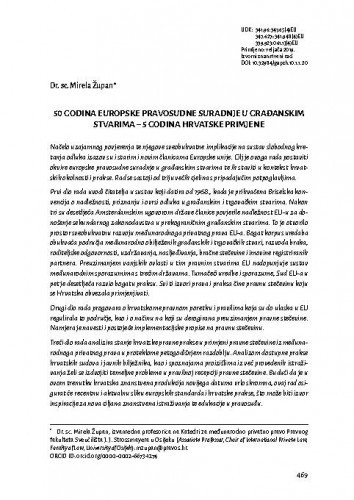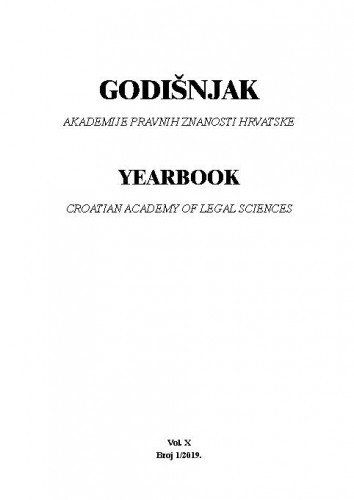Načelo uzajamnog povjerenja te njegove sveobuhvatne implikacije na sustav slobodnog kretanja odluka izazov su i starim i novim članicama Europske unije. Cilj je ovoga rada postaviti okvire europske pravosudne suradnje u građanskim stvarima te ih staviti u kontekst hrvatskih okolnosti i prakse. Rad se sastoji od triju većih cjelina s pripadajućim potpoglavljima. Prvi dio rada uvodi čitatelja u sustav koji datira od 1968., kada je prihvaćena Briselska konvencija o nadležnosti, priznanju i ovrsi odluka u građanskim i trgovačkim stvarima. Nakon tri su desetljeća Amsterdamskim ugovorom države članice povjerile nadležnost EU-u za donošenje sekundarnog zakonodavstva u prekograničnim građanskim stvarima. To je otvorilo prostor sveobuhvatnu razvoju međunarodnoga privatnog prava EU-a. Bogat korpus uredaba obuhvaća područja međunarodno obilježenih građanskih i trgovačkih stvari, razvoda braka, roditeljske odgovornosti, uzdržavanja, nasljeđivanja, bračne stečevine i imovine registriranih partnera. Preuzimanjem vanjskih ovlasti u tim pravnim stvarima EU nadopunjuje sustav međunarodnim sporazumima s trećim državama. Tumačeći uredbe i sporazume, Sud EU-a u pet je desetljeća razvio bogatu praksu. Svi ti izvori prava i praksa čine pravnu stečevinu koju se Hrvatska obvezala primjenjivati. Drugi dio rada progovara o hrvatskome pravnom poretku i pravilima koja su do ulaska u EU regulirala to područje, kao i o načinu na koji su derogirana preuzimanjem pravne stečevine. Namjera je navesti i postojeće implementacijske propise na pravnu stečevinu. Treći dio rada analizira stanje hrvatske pravne prakse u primjeni pravne stečevine iz međunarodnoga privatnog prava u proteklome petogodišnjem razdoblju. Analizom dostupne prakse hrvatskih sudova i javnih bilježnika, kao i spoznajama proizišlima iz već provedenih istraživanja želi se izdvojiti temeljne probleme u pravilnoj recepciji pravne stečevine.; The principle of mutual trust and its comprehensive implications for the free movement of judgements are challenging both for the old and new members of the European Union. This paper will outline the European judicial cooperation in civil matters and place it in the context of Croatian circumstances and practice. The paper consists of three major units with the corresponding subchapters. The first part is an introduction to a system that dates back to 1968 when the Brussels Convention on Jurisdiction, Recognition and Enforcement of Decisions in Civil and Commercial Matters was adopted. Three decades later, the Member States entrusted the EU by the Amsterdam Treaty to adopt secondary legislation in cross-border civil matters. This has opened the way for the comprehensive development of private international law in the EU. The Acquis encompasses areas of cross-border contacts and torts, divorce, parental responsibility, maintenance, succession, marital property and property of registered partners. By assuming external powers in these legal matters, the EU complements the system of international agreements with third countries. By interpreting the regulations and agreements, the Court of Justice has developed a rich body of case law over five decades. All these sources of law constitute the Acquis communautaire which Croatia has committed itself to comply with. The second part of the paper discusses the Croatian legal system and the rules that regulated this area before the EU accession, as well as the way they have been derogated by the Acquis. The existing implementing legislation is cited. The third part analyzes the Croatian legal practice focusing on the application of the Acquis in private international law over the last five years. The author analyzes the available case law of Croatian courts and records of public notaries, as well as findings of previous research. The author addresses the underlying problems in the reception of the Acquis.
Sažetak

 Godišnjak Akademije pravnih znanosti Hrvatske : Yearbook Croatian Academy of Legal Sciences : 10,1(2019) / glavna urednica, editor-in-chief Irena Majstorović.
Godišnjak Akademije pravnih znanosti Hrvatske : Yearbook Croatian Academy of Legal Sciences : 10,1(2019) / glavna urednica, editor-in-chief Irena Majstorović.